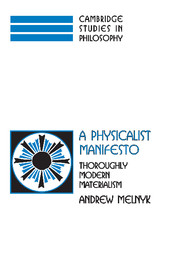Book contents
- Frontmatter
- Contents
- Preface
- Introduction
- 1 Realization Physicalism
- 2 But Why Not Supervenience?
- 3 Realizationism and R*d*ct**n*sm
- 4 Causation and Explanation in a Realizationist World
- 5 The Evidence against Realization Physicalism
- 6 The Evidence for Realization Physicalism
- References
- Index
- Titles in the series
2 - But Why Not Supervenience?
Published online by Cambridge University Press: 02 September 2009
- Frontmatter
- Contents
- Preface
- Introduction
- 1 Realization Physicalism
- 2 But Why Not Supervenience?
- 3 Realizationism and R*d*ct**n*sm
- 4 Causation and Explanation in a Realizationist World
- 5 The Evidence against Realization Physicalism
- 6 The Evidence for Realization Physicalism
- References
- Index
- Titles in the series
Summary
REALIZATIONISM, SUPERVENIENCE, AND PHYSICAL NECESSITATION
The recent literature on the problem of formulating physicalism has construed physicalism as, or as importantly including, some thesis of global supervenience to the effect, roughly, that any possible world that is indiscernible from the actual world physically is indiscernible from the actual world simpliciter. The exact role that the supervenience thesis is intended to play in the formulation of physicalism varies from author to author and is sometimes left rather obscure. John Haugeland (1982) seems to take an appropriate global supervenience claim to constitute the whole of physicalism, as do David Lewis (1983a), Terry Horgan (1987), and Frank Jackson (1998a). Geoffrey Hellman and Frank Thompson (1975) and John Post (1987) hold that at least some additional claim of physical exhaustion is required, but I do not know what exactly they regard as sufficient; perhaps they regard a supervenience thesis (or equivalent claim) as expressing physicalism about properties, whereas other claims are required to express physicalism about particulars.
As we saw in the previous chapter, however, realization physicalism departs from this recent tradition by making no explicit claim of supervenience. But such a departure requires explanation. For realizationism, especially in its retentive guise, is committed to a posteriori identity claims that, despite my best efforts, may strike even physicalist readers as implausibly strong, or at least as needlessly risky; moreover, it will be no surprise to learn that, as I argue in chapter 3, retentive realizationism has consequences that are reductionist – or, if not reductionist, then just as likely as reductionism to be found offensive by those who find reductionism offensive.
- Type
- Chapter
- Information
- A Physicalist ManifestoThoroughly Modern Materialism, pp. 49 - 70Publisher: Cambridge University PressPrint publication year: 2003



